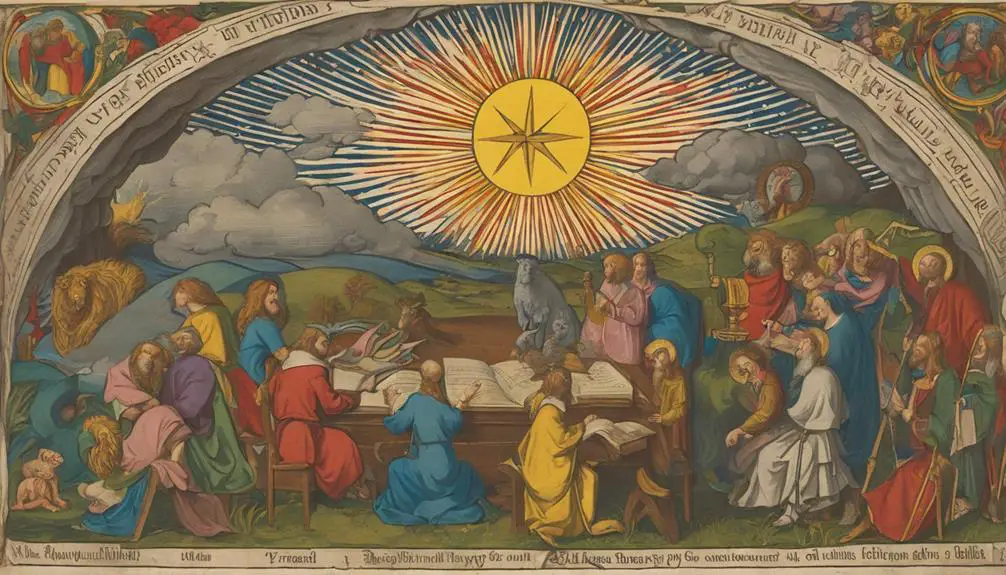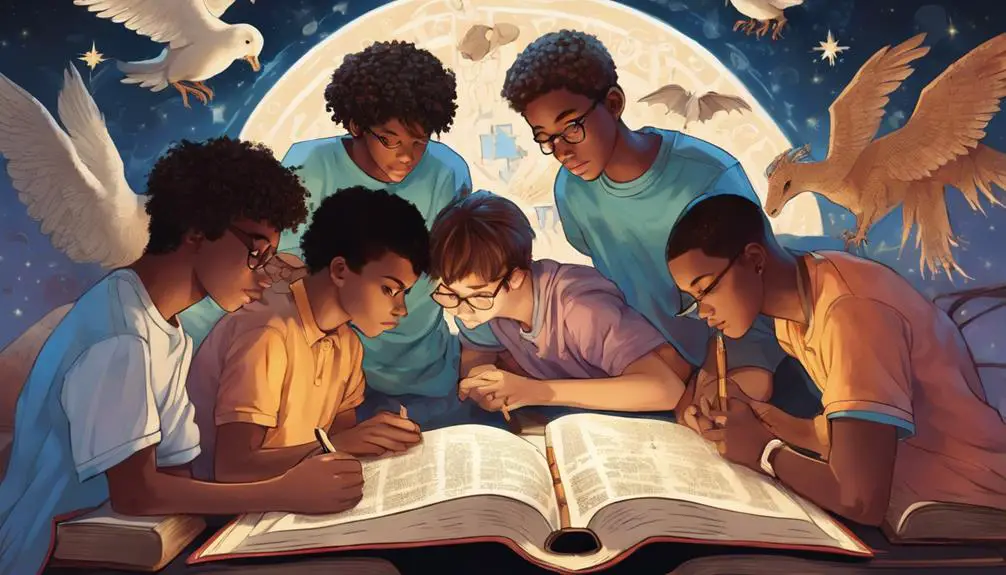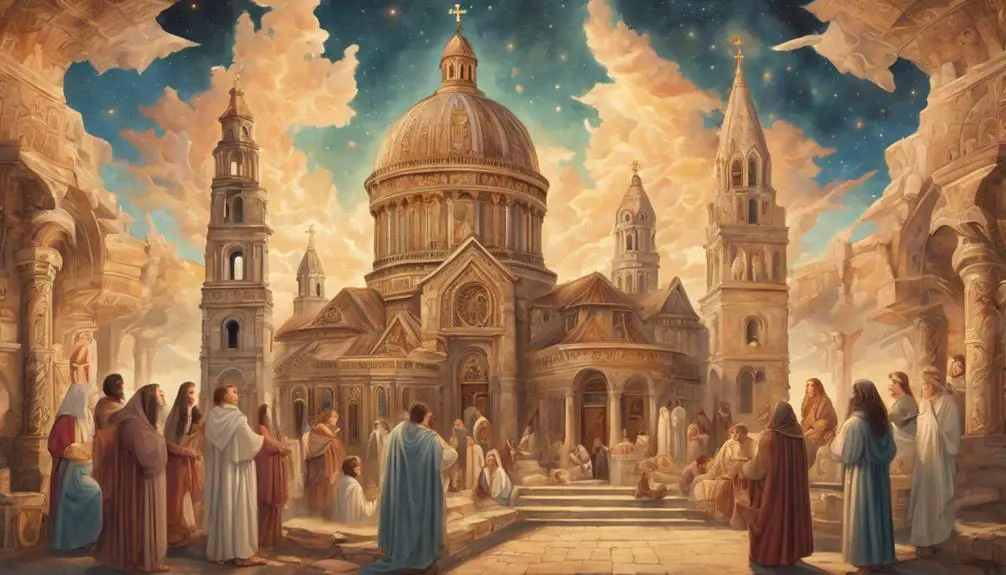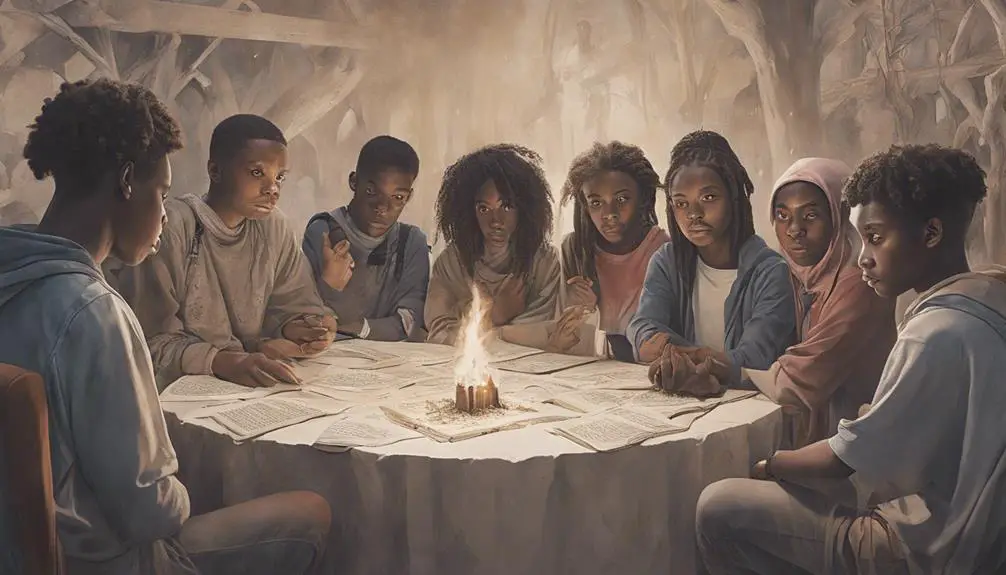Unravel the mysteries of the Book of Revelation in this engaging bible study tailored for youth, promising a fascinating exploration into its modern-day messages.

Revelation Bible Study for Youth
Imagine you're sitting in your youth group, the topic of the Book of Revelation comes up, and suddenly, everyone's eyes widen with intrigue and a bit of apprehension.
It's a part of the Bible that's often shrouded in mystery, filled with symbols and visions that can be difficult to comprehend. But what if you could crack open its secrets? What if you could understand the messages it holds for today's world?
Stick around, we've got an enlightening discussion ahead that's bound to shed some light on this fascinating book.
Key Takeaways
- Understanding Revelation can deepen youth's knowledge of end times and God's triumph over evil.
- Revelation's rich symbolism teaches important spiritual truths, encouraging greater exploration of biblical mysteries.
- The Seven Churches in Revelation offer valuable lessons on faith, devotion, and resistance against false teachings.
- Applying Revelation's themes of faith, resistance, and hope can guide youths in navigating modern life challenges.
Understanding the Book of Revelation

While it may seem daunting at first, understanding the Book of Revelation can be a truly enlightening journey, offering a deeper insight into the mysteries of the Bible. You don't have to be a theologian to grasp its teachings. It's a part of your spiritual journey and growth.
This last book of the New Testament, often referred to as the Apocalypse, is a prophetic book filled with visions and symbolism. It was written by John, one of Jesus' apostles, while he was in exile on the island of Patmos. The book is composed of John's visions about the end times, the final judgement, and the ultimate triumph of good over evil.
Understanding the Book of Revelation involves recognizing its purpose. It's not meant to scare you, but to reassure you of God's sovereignty. It emphasizes God's final victory and encourages you to remain steadfast in your faith.
Key Symbols and Their Meanings

Diving into the symbols and their meanings in the Book of Revelation can unravel a whole new layer of understanding for you. Let's start with the symbol of the Lamb. It represents Jesus, the Lamb of God, who was sacrificed for the sins of the world. In Revelation, the Lamb appears victorious, symbolizing Jesus' resurrection and triumph over death.
Next, you'll encounter the symbol of the dragon, which represents Satan. It's a stark contrast to the Lamb, highlighting the battle between good and evil.
The symbol of the seven-headed beast is also noteworthy. It's often interpreted as representing worldly kingdoms or empires that oppose God's people.
Another symbol is the number seven. It's used repeatedly throughout Revelation, symbolizing perfection and completeness. For instance, the seven seals, trumpets, and bowls all signify God's complete judgment.
Lastly, there's the symbol of the white robe. This signifies purity and righteousness, often worn by those who've remained faithful to God.
These symbols aren't just random images; they carry deep meaning and help us understand the complex messages in Revelation. As you continue to study, you'll uncover even more symbols, each adding a new dimension to your understanding.
The Seven Churches: A Closer Look

After exploring the rich symbolism in Revelation, let's turn our attention to the seven churches mentioned in this profound biblical book. You'll find each church represents distinct types of communities, attitudes, and challenges, both historical and contemporary.
Imagine yourself walking through ancient Asia Minor, now Turkey, where these seven churches were located. Ephesus, known for its devotion yet faulted for losing its first love. Smyrna, a suffering yet faithful church. Pergamum, where false doctrines threatened. Thyatira, commended for its charity but criticized for tolerating false teachings. Sardis, a church that seemed alive but was spiritually dead. Philadelphia, a small but faithful congregation. And finally, Laodicea, a lukewarm church that God wished to be either hot or cold.
These seven churches aren't just historical markers; they're mirrors reflecting our own spiritual health. As we delve deeper, you'll discover how these messages resonate with your personal faith journey. Are you zealous like Ephesus but have forgotten your first love? Or are you enduring trials like Smyrna, yet remaining steadfast in your faith? It's all about introspection and growth. So, let's dive in, ready for self-examination and eager for spiritual growth.
Unpacking the Apocalyptic Visions

So, what's next on our journey through Revelation? Let's unpack the apocalyptic visions, a captivating and complex component that often leaves readers puzzled yet intrigued. These visions, filled with symbolism, often present a challenge, but don't be discouraged. They're not designed to be a baffling puzzle, but rather, a vivid picture of God's sovereignty amidst chaos.
The visions in Revelation, like the four horsemen or the beast from the sea, aren't just random nightmares. They're deeply symbolic, each element pointing us towards greater truths about God's character and His plans for humanity. They're meant to inspire awe, not fear.
Imagine you're an artist, painting a scene of a future event. You'd use symbols, right? An eagle for freedom, a storm for trouble brewing. That's what these visions are like. They're God's masterpiece, His way of communicating his divine purposes.
Applying Revelation to Modern Life

Navigating the complexities of Revelation, you might wonder how these ancient writings can influence your modern life. Yet, it's not as far-fetched as it might seem. Revelation's primary themes of faith, resistance, and hope can guide your actions and decisions today.
Consider this table:
Revelation Themes |
Modern Application |
|---|---|
Faith |
Trusting in God's plan, even when life makes no sense |
Resistance |
Standing against societal pressures that contradict your beliefs |
Hope |
Believing in a better future, regardless of current circumstances |
Faith, in Revelation's context, teaches you to trust in God's ultimate plan, even when life seems chaotic. It's about having confidence that God is in control, even when you can't see the full picture.
Resistance is also a significant theme. It's about standing firm in your beliefs, resisting societal pressures to conform to standards that contradict your faith.
Lastly, there's hope. Hope in Revelation is about believing in a better future, regardless of your current circumstances. It's about having an eternal perspective that goes beyond your current troubles.
Conclusion
So, you've journeyed through the Book of Revelation, deciphered key symbols, examined the Seven Churches, and unpacked apocalyptic visions.
Now it's time to apply what you've learned to your own life. Remember, Revelation's not just about future predictions. It's about living faithfully today.
Don't be afraid of its complexity. Embrace it, explore it, and let it challenge and deepen your faith.
You're doing great, keep pressing on!



Sign up